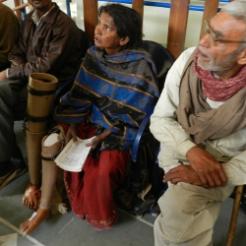The Paul Hamlyn Foundation has elected to celebrate its 25th anniversary by giving a £1m endowment to an Indian charity providing prosthetics.
The endowment follows the UK government's decision to halt aid to India from 2015 and is made as part of a wider strategy by the Foundation to build capacity of Indian NGOs.
The Paul Hamlyn Foundation has given 140 organisations in India a total of £9.2m since its establishment in 1987. It has provided Jaipur Foot, the recipient of the £1m endowment, with support totalling £800,000 throughout the last 22 years.
Jane Hamlyn, chair of the Paul Hamlyn Foundation, said: "We are delighted to announce this special gift to Jaipur Foot as part of our 25th anniversary celebrations. Our funding will help Jaipur Foot to support many more people affected by severe disabilities regain their mobility and play an active role in society.
"Our mission is to help people to realise potential and maximise their quality of life, and our gift delivers this in a very direct way for many thousands of people in India and beyond."
Jaipur Foot has provided over 12 million prostheses in India and abroad since its launch in 1975. Some 99 per cent of its patients live below the poverty line and all prostheses are provided for free. The organisation has received a number of awards for its work in India and its founder and chief patron Devendra Raj Mehta received the Tech Award for the Benefit of Humanity from California's Tech Museum of Innovation in 2008. Its £1m boost will support the continued fitting of prosthesis through the newly-named Paul Hamlyn International Research Centre for Prosthetics and Orthotics in Jaipur.
Supporting local NGOs
The Paul Hamlyn Foundation advises it chooses to support NGOs in India rather than funding UK or international organisations operating in the area. The Foundation's sizable money-where-its-mouth-is donation provides further emphasis to its stance following the announcement by the new Development Secretary Justine Greening that no new aid grants will be made to India and all current aid programmes will end completely in 2015.
Greening said that the UK would now move towards a skill-sharing principle with India: "After reviewing the programme and holding discussions with the government of India this week, we agreed that now is the time to move to a relationship focussing on skills-sharing rather than aid.
"Having visited India I have seen first-hand the tremendous progress being made. India is successfully developing and our own bilateral relationship has to keep up with 21st century India. It's time to recognise India's changing place in the world," she said.
Aid organisations have criticised the move as 'premature'. A spokesman for the Paul Hamlyn Foundation said: "There remains a lot of need within India. There is still 300 million-plus people who are living in poverty.
"We're still motivated to have as great an impact as possible and that is what our funding hopes to achieve."









